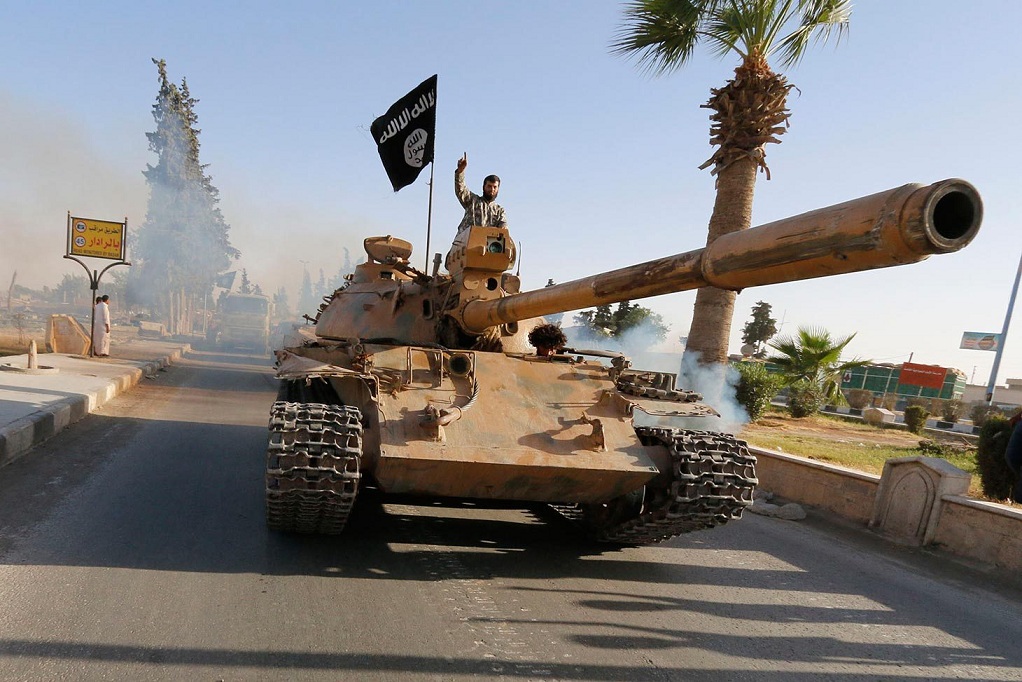Throughout the course of hostilities in the Middle East in recent years more than 220 Kazakhstani militants have been killed in hostilities in Iraq and Syria, according to Kazakhstan’s Deputy Chairman of the National Security Committee Nurgali Bilisbekov.
"Over 220 citizens of Kazakhstan died in hostilities for the entire period of the conflict, starting from 2011 to the present,” Bilisbekov told at Kazakhstani Senate meeting this past week, according to BNews.kz.
The majority of the Kazakh militants are in Syria, and the republic’s security agency is determined to prevent their return back home. The Kazakhstani Security Committee is aware of the militants’ whereabouts, Bilisbekov said.
“Undoubtedly, we know the location of the militants, but the overwhelming majority are wives, children, and as the situation on the scene is changing daily, we cannot exactly say where they are,” he added.
Kazakhstan is closely cooperating with the International Criminal Police Organization, more commonly known as Interpol, and countries in the Middle East to help track down Kazakhstani militants that have gone abroad to fight, particularly in the civil war in Syria. Kazakhstan’s security agencies have vowed to detain them if they cross the country’s border to return home, according to Bilisbekov.
In 2017, Kazakhstan convicted 157 people for terrorism or religious extremism.
“Terrorist and extremist activities have been prevented and 11 violent acts of terrorism were thwarted in 2017," Bilisbekov said, according to Tengrin News.
"We were able to extradite and deport from the countries of the Middle East, primarily Saudi Arabia, the main preachers of religious extremist movements, including Abdukhalil Abdujaparov, who was convicted,” Bilisbekov said. Astana has accused Abduzhaparov of spreading extremism in Kazakhstan, especially in the western parts of the country, which contradicts local traditions.
Reporting to the Senate hearing, Nurgali Bilisbekov said that 63 children had been returned and nearly 50 others were expected to arrive home from Syria.
"I will say straight away that 390 children under the age of 16, including 214 boys and 176 girls, are in the Syrian-Iraqi zone now. These are significant figures. We will certainly have to do a lot of work to rehabilitate those children," he added.
He noted that the special services were doing their best to register the names of the children who are in hot spots.
"By reporting the numbers, we can guarantee that they correspond to reality. All of them are certainly in the zones of active military operations of the coalition as well as the Syrian army. We cannot say for sure if all the children are alive," Bilisbekov said.
Bilisbekov noted that Kazakhstani citizens present in Iraq and Syria also find themselves in areas that are being hit by air strikes. Tracking citizens’ whereabouts is not easy, especially given that the country does not have consular services or representatives in those areas.
The top security official also focused on activities at home and organizational work to ensure systematic de-radicalization of people, including children returning from Syria and other areas. An inter-agency working group under the Ministry of Education and Science of the republic at the initiative of the anti-terrorism center has been tasked with setting measures for rehabilitating children returning home from war zones.
Kazakhstan is staunchly against any forms of religious extremism.
On December 12, the National Security Committee detained three residents from the northern Kazakhstani town of Stepnogorsk for spreading terrorism-related materials via social networks.
In another move to prevent radicalization, Kazakhstan amended legislation to ban children from attending religious ceremonies without the presence of adults.
“The requirement is that there must always be an accompanying adult. We are talking about either of their parents or close adult relatives, such as brothers, sisters, grandfathers, grandmothers or legal representatives,” said Deputy Minister of Religious Affairs and Civil Society Berik Aryn. “Another mandatory condition is that the second parent should not object," Aryn said.







 President Aliyev emphasized the critical role of the North-South Transport Corridor in fostering transport cooperation between Azerbaijan and Russi...
President Aliyev emphasized the critical role of the North-South Transport Corridor in fostering transport cooperation between Azerbaijan and Russi...
 Armenian sappers commenced on Monday mine-clearance operations in the territories adjacent to the Saint Mary Church in village of Voskepar (Armenia...
Armenian sappers commenced on Monday mine-clearance operations in the territories adjacent to the Saint Mary Church in village of Voskepar (Armenia...
 The Mine Action Agency of Azerbaijan (ANAMA) reported on Thursday the discovery of a significant amount of explosives in the Khojavand district of ...
The Mine Action Agency of Azerbaijan (ANAMA) reported on Thursday the discovery of a significant amount of explosives in the Khojavand district of ...
 Russian Foreign Minister Sergei Lavrov has reasserted that Moscow has no intentions to stop the fighting in Ukraine, even if peace talks commence.
Russian Foreign Minister Sergei Lavrov has reasserted that Moscow has no intentions to stop the fighting in Ukraine, even if peace talks commence.
 Iran’s Foreign Minister, Hossein Amir-Abdollahian, has labeled a foiled Israeli drone attack in certain parts of the country as a "failure" for Isr...
Iran’s Foreign Minister, Hossein Amir-Abdollahian, has labeled a foiled Israeli drone attack in certain parts of the country as a "failure" for Isr...
 Iran has refuted reports of alleged damage to Shimon Peres Negev Nuclear Research Centre located southeast of Dimona, Israel, during the recent air...
Iran has refuted reports of alleged damage to Shimon Peres Negev Nuclear Research Centre located southeast of Dimona, Israel, during the recent air...



